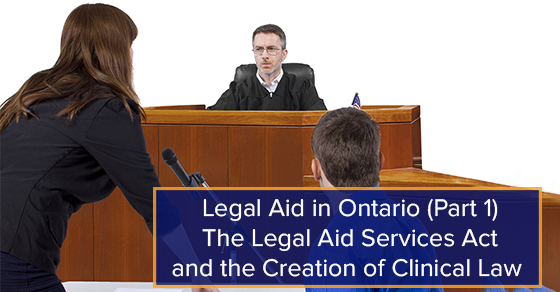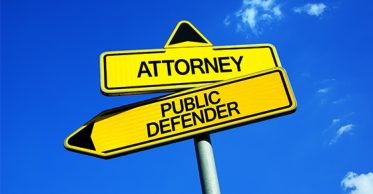Legal Aid in Ontario (Part 1) The Legal Aid Services Act and the Creation of Clinical Law

Blog by Cassandra Beaulac
“Poor people are not just like rich people without money…” Stephan Wexler, a distinguished professor of the Peter A. Allard School of Law at UBC once said.
Low-income people in Ontario required distinct legal needs from their middle and upper-class counterparts. The Ontario government introduced the Legal Aid Services Act(“LASA”) in 1998, creating an independent agency that is now known as Legal Aid Ontario. The LASA was created as a result of the response and call on the Ontario government to promote better access to justice throughout Ontario for low-income individuals seeking legal advice and representation, especially those in the criminal context. The LASA identified the following purposes for achieving the long-sought after “access to justice” for its most marginalised community:
(1) Providing consistently high quality legal aid services in a cost-effective and efficient manner to low-income individuals throughout Ontario;
(2) Encouraging and facilitating flexibility and innovation in the provision of legal aid services, while recognizing the private bar as the foundation for the provision of legal aid services in the areas of criminal law and family law, and clinics as the foundation for the provision of legal aid services in the area of clinic law;
(3) Identifying, assessing and recognizing the diverse legal needs of low-income individuals and of disadvantaged communities in Ontario, and;
(4) Providing legal aid services to low-income individuals through a corporation that will operate independently from the Government of Ontario but within a framework of accountability to the Government of Ontario for the expenditure of public funds.
The LASA identifies “clinics” as “independent community organizations structured as a corporation without share capital that provides legal aid services to the community it serves on a basis other than fee for service”. “Clinical law” is the practice of law which particularly affects low-income individuals or disadvantaged communities. These legal matters are often related to certain criminal matters, human rights, health, employment and education, housing and shelter, income maintenance, social assistance and other similar government programs.
Prior to the enactment of the LASA, private bar lawyers often focused their practice upon areas that supported clients who could pay for their legal services. Therefore, areas of law that were of critical importance to clients who could not pay for legal services or representation were not practised by private bar lawyers, or even recognized and celebrated as “legitimate” areas of law. Areas of law that disproportionally affected low-income individuals such as landlord-tenant law, employment standards law, social assistance appeal work and litigation were not practised by private bar lawyers.
The legal literacy of those not employed in the legal sector is considered low, and was considered virtually non-existent for those living in impoverished communities. Low-income individuals were often blissfully unaware of their legal rights or the existence thereof. The creation of the LASA imposed a duty on the government to provide proactive outreach and educational measures to Ontario’s low-income communities, such as Public Legal Education (“PLE”) projects. PLE projects are a common mandate of Ontario’s legal aid clinics.
Most compelling put forth for the implementation of the LASA was the promotion of a body of reasoning that supported that low-income individuals were burdened by a complex, and difficult to navigate regulatory scheme that governed their everyday lives. The vast majority of low-income individuals were the recipients of social assistance, lived in social and public housing, and were dependent upon the government for their housing and income maintenance needs. Their lives and legal problems were not “discrete” in nature, but rather, more systemic. A systemic approach to the distinct and unique legal problems of the low-income community stood in stark contrast to the legal issues affecting middle or high-income individuals, such as the purchase or sale of a home, the drafting of a will, the granting of a divorce, or the incorporation of a business. Whereas a case-by-case basis was appropriate in serving the aforementioned clients, it didn’t achieve the same success with low-income individuals who required fundamental law and social reform to address their legal needs.
Community Legal Aid (“CLA”), located in Windsor, Ontario is one of these clinics that is funded by LAO, and that operates out of one of Ontario’s law schools. Along with Ontario’s seven other Student Legal Aid Service Societies (“SLASS”), CLA handles summary conviction matters that are of relatively minor in nature, and have no possibility of imprisonment upon conviction. Those who wish to visit a SLASS clinic must not qualify for an LAO Certificate. Frequently, LAO refers to those who have been rejected due to financial admissibility for LAO to the nearest SLASS clinic.
To find a SLASS Clinic near you, visit the LAO website here: https://www.legalaid.on.ca/en/contact/contact.asp?type=slass
Cassandra Beaulac is a recent graduate of the University of Windsor Law School


